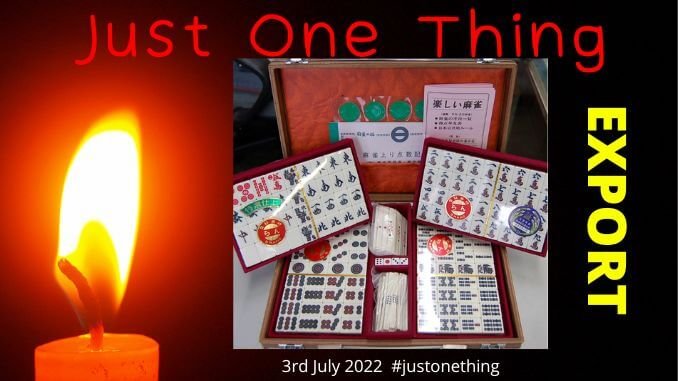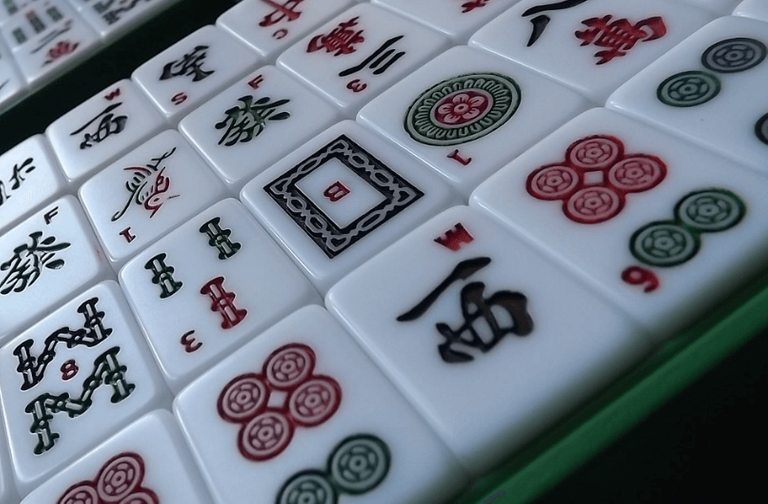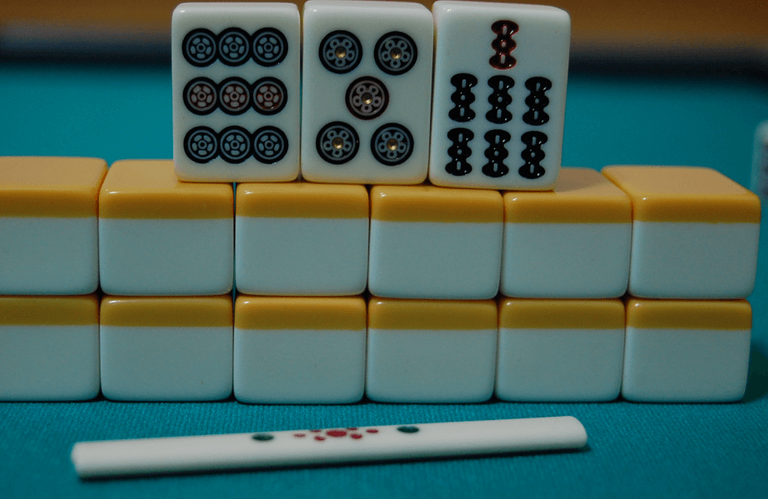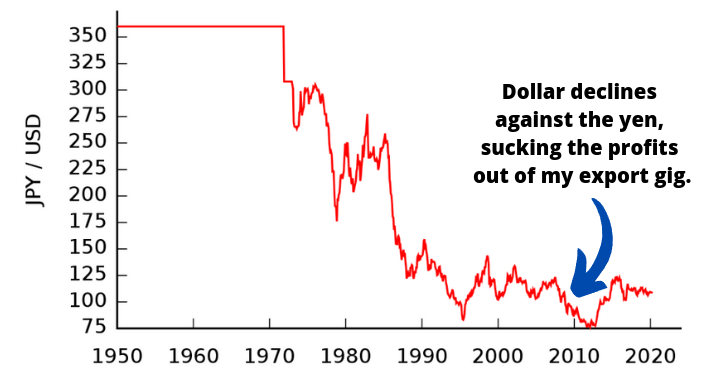JustOneThing - My Previous Side Gig: Exporting Japanese Mahjong Sets All Over The World

Throughout the first decade of the 21st century I ran a successful little export side-gig selling Japanese mahjong sets (and other games) to customers all over the world.
Back in those days I was a keen Japanese mahjong player. I played a "three-player" variation that is (or was) popular in Hiroshima, and I blogged about the beer-fueled gaming sessions that usually continued deep into the early hours of the morning. (The phenomenon of "all night mahjong" is known as "tetsu-man" in Japan.)
Then I added a shop page to my blog and began to offer Japanese mahjong sets.
In the early days my target markets were the USA and UK. I never really expected to export any mahjong sets from Japan for a couple of reasons:
You can buy mahjong sets in the USA and UK.
The cost of shipping a mahjong set by Japanese "Express Mail Service" was about the same as the cost of the set itself. In other words, you have to pay DOUBLE to buy the set and have it shipped to your door.
My Unique Selling Proposition
In spite of those doubts, I had an crucial "Unique Selling Proposition" that proved to be a winner...
The mahjong sets that are made for the US and UK markets have arabic numerals embedded in the top right or left corner of the tiles to help American and British players read the tiles:

However, Japanese mahjong sets do not have those numerals and letters.
Tiles made for the US and UK markets are also more "Chinese" in style and proportion than the slightly smaller and more highly finished Japanese tiles.
Those key differences turned out to give me a unique edge as there was a lot of interest in Japanese-style mahjong, which is known as "riichi" or "reach" mahjong and which many people consider an improvement on the Chinese game.
Here is a selection of Japanese mahjong tiles from three different sets that I used to sell:

I think another factor in my favour was that people knew they were buying Japanese mahjong sets from a keen Japanese-style mahjong player living in Japan. They were not only getting a genuine piece of Japanese culture, they were getting it from an expert in the game who also knew a lot about the specifications of the different quality sets and would not sell cheap junk. Every mahjong set I sold was produced to Japanese quality standards.
Even so, I was really surprised when the sales started to roll in!
(In those days, I hadn't even heard of "keywords" or "keyword research." All I did was blog about "Japanese Mahjong Sets" and although I was oblivious to "keywords" the "keywords" simply came naturally or organically out of the topic I was writing about.)
For several years my blog was the only place where you could buy "genuine Japanese mahjong sets."
Also, I was operating in a period where the exchange rate was quite favourable as the dollar had recovered from the lows against the yen of the "endaka" period during the second half of the 1990s.
As side-gigs go, it was a "nice little earner," and during the peak of the business I would earn anything from $500 to $1000 a month in profit from my venture.
However, several factors combined to suck the profitability out of the business and I although I kept it going simply out of habit, I eventually decided to shut down my micro export business in 2014.
Here are the reasons why I decided to shut down my export business:
1. Rising Competition
For a few years I was the only seller. Then I made a BIG mistake which lost me a lot of sales in the US market:
I decided to post some of my best-selling products on Amazon.com.
That alerted a bunch of other Amazon sellers to the possibility of selling Japanese mahjong sets and mahjong mats on Amazon. Some of those guys were already selling stuff through drop shipping quickly found drop-shippers who could supply sets for lower prices than I could offer them for.
2. Difficult to Scale
Selling Japanese games was a side gig. I could only sell as many sets as I could pack and ship in a day. Actually, if I got more than three or four orders per day I would be swamped simply because of the time it would take me to pack and ship each set.
3. The Return of "Endaka"
Sometime around 2008 the yen began to rise against the dollar, the pound and the euro. Although I sold to a worldwide customer base, sales came to me via Paypal and were mainly in dollars. All the time the dollar stayed above 110 to the yen I could make a reasonable profit on each sale, but as the dollar sank to below 100 to the yen, my profits tanked.

To anybody who wants to earn some money through the Internet, I would still recommend finding local products that you could export as a quick way to set up a profitable Internet-based side-gig for yourself.
However, you do need to think about exchange rates, scalability, and competition when you run that kind of business.
Of course, today, we also have the option of accepting Hive, Bitcoin and other crypto currencies, althoug that might add an extra layer of risk to your export side gig, as well as offering new potential.
I have happy memories of my Japanese Games export business, but it is not something I am planning to get back into even though the yen has declined against the dollar over the last few months...
Cheers.
David Hurley
!CTP I still love real games--much richer experience than computer games.
That's true. In good company a game like mahjong is a dynamic social experience.
!CTP
!ALIVE
@fiberfrau! You Are Alive so I just staked 0.1 $ALIVE to your account on behalf of @hirohurl. (6/10)
The tip has been paid for by the We Are Alive Tribe through the earnings on @alive.chat, feel free to swing by our daily chat any time you want.

!BEER
View or trade
BEER.Hey @hirohurl, here is a little bit of
BEERfrom @fiberfrau for you. Enjoy it!Do you want to win SOME BEER together with your friends and draw the
BEERKING.Your content has been voted as a part of Encouragement program. Keep up the good work!
Use Ecency daily to boost your growth on platform!
Support Ecency
Vote for new Proposal
Delegate HP and earn more
Interesting story. I guess there's always the consideration of whether something is a side-gig or whether it takes over (that's always been a bad move in my case). Also something to be said about checking out competitors, especially ones that can scale.
Thanks @shanibeer - in my case, it was always a side-gig, but it did sometimes encroach quite a lot on my free time.
!CTP
!ALIVE
@shanibeer! You Are Alive so I just staked 0.1 $ALIVE to your account on behalf of @hirohurl. (8/10)
The tip has been paid for by the We Are Alive Tribe through the earnings on @alive.chat, feel free to swing by our daily chat any time you want.

I only played it on pc or a phone, always saying it'll be just a couple of games ending up playing for hours sometimes telling myself if you finish this one, that's it, you can stop playing. But if I wasn't able to finish the game I had to do it again, if I finished the game then I was thinking, neh this one was a mistake, I need another one...
No more Mahjong for me, but I never had the chance to play with real tiles, I bet this is a game changer.
Voted on ListNerds!
Thank you for the upvote @drlobes !
Mahjong can be quite addictive! I think it's because of the combination of luck and skill, and also the way everybody has the tantalizing they are making progress towards completing a hand - and then somebody suddenly goes out and you have to start again!
!CTP
!ALIVE
@drlobes! You Are Alive so I just staked 0.1 $ALIVE to your account on behalf of @hirohurl. (9/10)
The tip has been paid for by the We Are Alive Tribe through the earnings on @alive.chat, feel free to swing by our daily chat any time you want.

I used to love playing Mahjong , haven't played it for some time now though
I shipped quite a few sets to Australia and New Zealand over the years... it would be a nice coincidence if you played with a set that I'd packed and shipped! 😸
!CTP
!ALIVE
@russellstockley! You Are Alive so I just staked 0.1 $ALIVE to your account on behalf of @hirohurl. (1/10)
The tip has been paid for by the We Are Alive Tribe through the earnings on @alive.chat, feel free to swing by our daily chat any time you want.

Thats a really cool side gig David! Selling on Amazon was probably a bad move for sure. Did you try ebay back then?
What about the Kimodo's? They could also be in demand.
Thanks @mypathtofire !
In the early days I experimented with e-Bay, but I gave it up as it was more profitable and less hassle to sell directly from my blog.
Funnily enough I did briefly experiment with kimonos. I bought two or three second hand ones really cheaply, but I'm not a specialist and every garment is different and then there is the question of finding a good fit for the customer, so I quickly abandoned the project.
Other items I sold successfully were: Japanese hanafuda card decks, Japanese chess sets including beautiful high-quality pieces, Pilot pens, paperback Japanese dictionaries and lexicons, and a whole assortment of second-hand manga!
!CTP
!ALIVE
@mypathtofire! You Are Alive so I just staked 0.1 $ALIVE to your account on behalf of @hirohurl. (1/10)
The tip has been paid for by the We Are Alive Tribe through the earnings on @alive.chat, feel free to swing by our daily chat any time you want.

Fantastic work! Very impressive. !CTP !ALIVE
@hirohurl! You Are Alive so I just staked 0.1 $ALIVE to your account on behalf of @mypathtofire. (1/20)
The tip has been paid for by the We Are Alive Tribe through the earnings on @alive.chat, feel free to swing by our daily chat any time you want.
